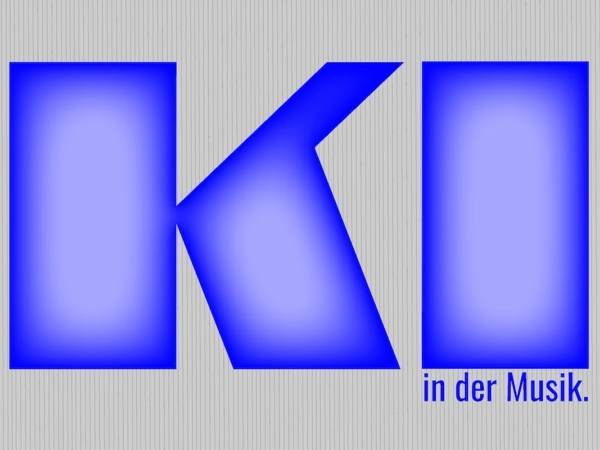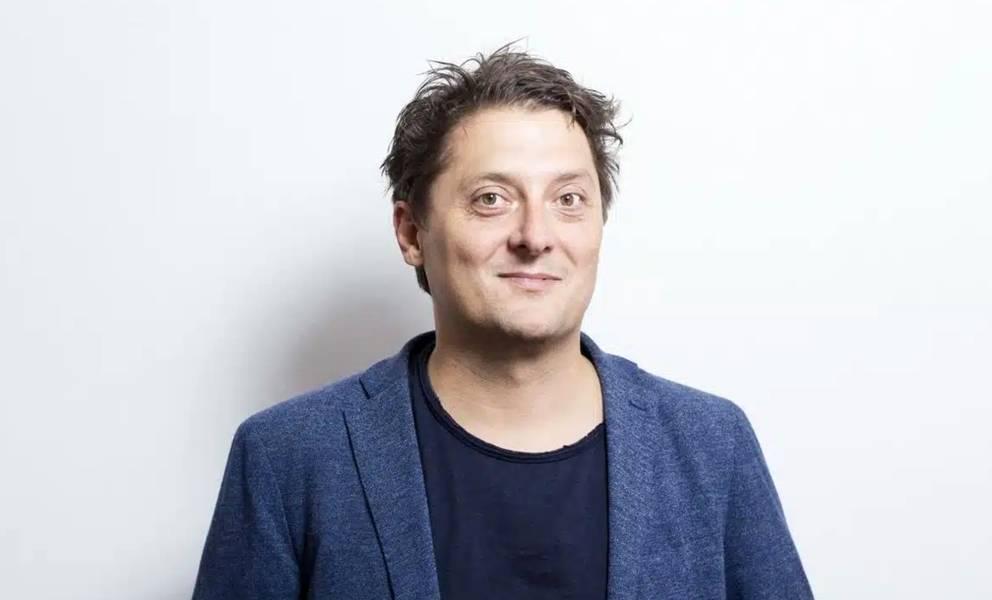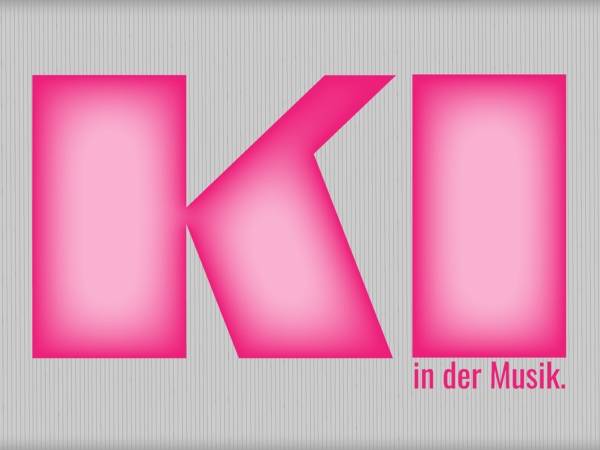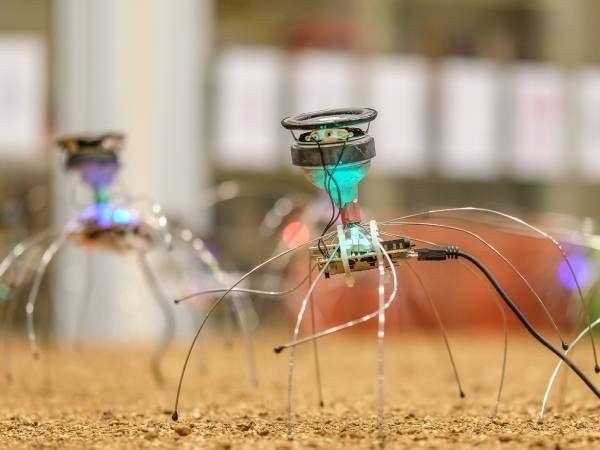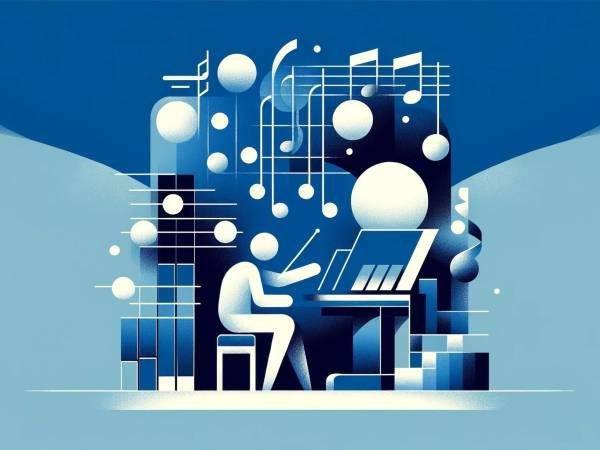10 Minuten
Artificial intelligence is changing the professional world, including that of musicians. But what do music creators have to fear from AI? Will AI use their works without having to pay for them? Will AI even replace them, devalue their art? And what happens to works created using AI? Do they enjoy copyright protection? An attempt to approach a complex phenomenon that will occupy all music creators in the coming years. For all those who have not yet read it, read also part 1 and part 2.
So much for the legal assessment of the input, i.e. the content with which AI is fed. But what about the output, i.e. the works created with the help of AI?
In the USA, the Copyright Office issued a very clear ruling in February of this year stating that copyright protection cannot be claimed for works created entirely on the basis of AI models, such as computer-generated images based on an AI model. Specifically, the case concerned a graphic novel by the author Kris Kashtanova. According to the ruling, the author is not able to protect the images generated by the AI program "Midjourney" in her graphic novel "Zarya of the Dawn". This is only possible for the texts she wrote and the image arrangement.
Subsequently, the US Copyright Office published a guideline that sets out how and under what circumstances copyright protection could be possible for works created with the help of AI tools and which essentially confirms and substantiates the "Zarya of the Dawn" decision. The basis of the decision and the current directive is that only works of human creativity could be protected in the USA. However, the shared use of AI technology alone is not a direct reason for exclusion from copyright protection. The Copyright Office explained that in future, the authority will examine whether the machine has merely helped and whether the previous criteria for copyright protection have been met. This in turn depends on the way the AI works and can only be assessed on a case-by-case basis.
A similar situation is regulated in Austria in Section 1 of the Copyright Act, which stipulates that a peculiar intellectual creation can only be created by a human being, but not by an animal, a computer or an algorithm. Only works created by human hands therefore enjoy copyright protection.
The EU also stated this in a study commissioned by the Commission and published in March 2022 entitled "Copyright and New Technologies". And in a statement sent to me by the press officer in response to a specific request to the EU Commission's legal department, it says: "In line with the study results, if General Purpose AI (GPAI) tools, like image-generating AI applications, generate output without human creative choices, such an output is not protected by copyright." So far so good. Purely computer or algorithm-generated content therefore enjoys no protection.
AI - artist or source of inspiration?
But a work that is created with the help of a computer should enjoy protection, says Gernot Schödl, if I only use the computer as a tool. Of course, there must always be a human behind it, controlling it and making the key decisions. To stay with the US case of an AI-generated comic: According to Schödl, you have to differentiate. If I only give the machine a few instructions on how to illustrate, the work will not enjoy protection. However, if I prompt very creatively, if I sit down for about five hours and tell the AI down to the last detail what it has to do and what the final result should be, the result should also be protected. Otherwise, there will inevitably be a contradiction in terms, because the requirements for the level of work in copyright law are very low. Schödl brings the example of a "Schüttbild" by Nitsch into play. Someone pours paint (or blood) onto a canvas and the result is considered a work within the meaning of the Copyright Act.
Another example is the so-called Eurobike decision (in which the author of this article is not entirely innocent, because he personally obtained it as a representative of the plaintiff at the Supreme Court when he was still working as a lawyer). It states verbatim: "Photographs are to be judged as photographic works, provided that only the means of design used create distinctiveness. This criterion of distinctiveness is always fulfilled if it can be said that another photographer might have designed the photograph differently."
However, the fact that another photographer would have taken the photo differently is logically already the case if he or she would have used a different camera or taken the picture at a different time. This means that almost every photo, whether artistically intended or not, is a work within the meaning of copyright law. But a sequence of images for which I have spent hours instructing a machine is not? The current legal situation says: No, there is no protection for this.
Schödl advocates a case-by-case assessment (as suggested by the US Copyright Office) and receives support from the EU Commission, which writes specifically in the statement sent to me:
"Even if the general copyright rules are clear, each situation involving AI programs may be different. Therefore, each of such situations should be considered on a case-by-case basis as the ultimate legal assessment may differ."
Now let's assume I'm working on a 300-page crime novel based on one of the plots generated by Chatbot. With my characters, my intellectual output. How is that to be judged?
Gorzala says: "If you take one of these five-line moments of inspiration and work it out completely independently, that is of course to be judged completely differently than if you just tell the AI: Please write me a novel on this topic. That will be your work, based on an AI idea. Artists have always inspired each other. In this case, the source of inspiration is technical."
After everything we've heard so far, do we have to fear for our jobs or not?
From a filmmaking perspective, Schödl believes that the voiceover profession will soon only be spoken by AI as far as image is concerned, that the profession of dubbing actor will soon no longer exist at all and that developments will also have a significant impact on the big picture. Gorzala sees things differently: "For simple things, such as speaking a standardized sentence in a call center, the industry will probably rely on AI in the future. Wherever the human voice does not add value, it will probably be an artificial voice. But it is precisely when it comes to touching people through intonation, voice color and sound that human speakers will survive. The AI results still sound very wooden. It is still difficult to convey emotion through voice. That's where the future of voice actors is heading. But once again, there's nothing wrong with having my voice synthesized. It's just that if it's used, you have to be fairly remunerated for it."
There's no question about it: whether it's voice-over artists, PR workers, journalists or musicians - some jobs are under massive threat. This makes it all the more exciting that a recent study by the International Labor Organization [ ILO for short, the International Labor Organization is a specialized agency of the United Nations tasked with promoting social justice as well as human and labor rights, note] has examined precisely this and concluded that technology is more likely to create new jobs than destroy existing ones.
"Isn't that weird?" I ask Gorzala. "Sure, AI will change the world of work," she says, "existing jobs will disappear, existing job profiles will change. But all in all, the fear that AI will make us all unemployed is not unfounded, because fear always has a reason, but it is unjustified. Of course, further training measures will be necessary in order to do justice to the completely changed job profiles. And we already have a shortage of talent and skilled workers. And it's only going to get worse. AI can be an opportunity, says the study, if it creates meaningful jobs."
Will AI really be able to create as many jobs as spokespeople, PR, journalists and musicians will lose? We will see.
Mass and power
However, a threat to art, especially literature and music, is also to be feared from the sheer mass of AI-generated publications that we are already confronted with. On Amazon, for example, sellers are asked when uploading books whether AI has been involved in their creation. It has also defined when content is considered "AI-generated" and when it is considered "AI-assisted". In Amazon's definition, "AI-generated" means that works have been created by AIs. "AI-supported" is when AI has only been used to find ideas, improve and check facts. The former must be identified. Amazon recently followed suit: Authors who publish with "Kindle Direct Publishing" will not be allowed to publish more than three books per day in future. The latter sounds absurd, but it illustrates the problem that the number of texts written by AI is not only increasing rapidly, but that they have long since made it onto the market. And as is always the case with the masses - we know this from music: the more that is available, the harder it is to find the good stuff, which sometimes gets lost in the masses.
Another problem is the concentration of power. Without exception, AI systems belong to private companies. Meredith Whittaker, former employee of Google Open Research, therefore never tires of warning about this impending concentration of power in articles, interviews and lectures. Hardly anyone understands, she says, what social consequences this will have. Siegfried Handschuh takes a similar view: "The systems have become so big that they can only be built by large companies. Has research become undemocratic? Handschuh says yes. "The whole thing will be a challenge for all universities. We don't have the resources to train a language model for 12 million dollars. That has to be done in research networks. But people will believe what they find on Google and Wikipedia. And if ChatGPT catches on as a system, people will also believe its answers. The fact that such a normative comes from a company is questionable. The system is not neutral either. The machines have been taught an ethic that comes through in the answers. If I ask the machine for arguments in favor of climate change, it provides them. It only provides arguments against it with restrictions. So it's easy to see where the people who programmed it stand politically. As a curious researcher, I prefer systems that don't filter answers, but of course I can understand that companies do this because they are afraid of suffering a backlash. Some answers the system doesn't even give reluctantly, but not at all."
What does the future hold?
Is there a threat of "extinction for humanity", as OpenAI co-founder Sam Altman and many others put it quite dramatically in a joint statement? Where is the journey heading? "That depends entirely on how we use these technologies," says Emilia Gómez. "Technology always brings about social change, but technology is ultimately made by people and used by people. So why demonize technology? We need to develop technology in a trustworthy way so that it ensures social well-being."
Stefan Wally, futurologist and head of the Robert Jungk Library for Future Studies in Salzburg, points out that we usually have such debates about new technologies: "Criticism is often ridiculed by reminding us that people already thought the railroad was life-threatening." But concern is a good thing, "because when people became aware of problems through concern, they tried to regulate them. Safety and control standards were introduced." According to Wally, however, regulations require an actor that is strong enough to regulate. "Is a state strong enough to talk to international corporations in such a way that certain things are enforced?" The question is whether we as a democratic society trust ourselves to take certain democratic developments into our own hands. "The AI debate is a good example of this. The questions being asked are: "How will AI develop? What will it bring?" And not: "How do we want to shape AI?" It seems as if we no longer have any control over it because certain things have slipped out of our hands, because the power of certain companies is greater than that of regulating institutions."
But are we still in control? "Yes. It's about asking ourselves how we can strengthen international institutions so that they can intervene to regulate. That is not hopeless. We have the EU, which is in conflict with such institutions. We have to ask ourselves what we need. Then people will contribute their ideas and visions."
The only institution that can be strengthened to counteract the concentration of power mentioned above is the EU. We will see what the AI Act in its final version and other regulations/directives that may follow it will bring. In any case, it won't be easy if we remember the decades-long struggle for EU-wide copyright regulation that resulted in the Copyright Directive, which regulated many things but also left many things open. But giving up is not an option in this case. As Wally rightly points out, the participatory approach to democracy is more important than ever if we want to help shape what AI should - and shouldn't - be able to do.
This article first appeared on mica - music information center austria on December 19, 2023. As the topic of music and AI is of particular interest to Sounding Future, we have republished the article here as part of a cooperation between mica and Sounding Future.
Markus Deisenberger
Markus Deisenberger, born in Salzburg in 1971, is a lawyer and freelance journalist who lives and works in Salzburg and Vienna. He is editor-in-chief of a Salzburg city magazine and publishes regularly in German and Austrian magazines. He also writes novels, most recently "Winter in Vienna".
Article topics
Article translations are machine translated and proofread.
Artikel von Markus Deisenberger
 Markus Deisenberger
Markus Deisenberger 